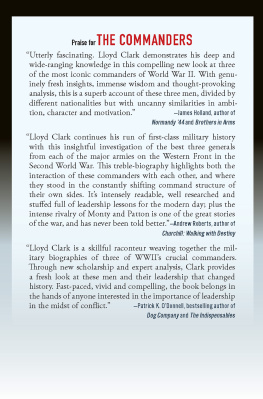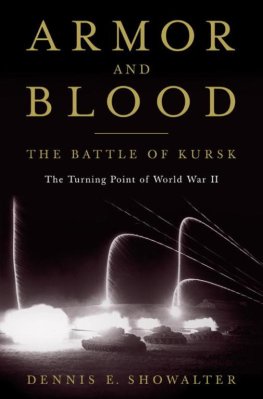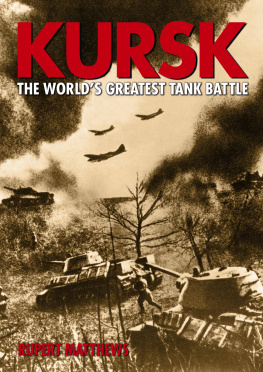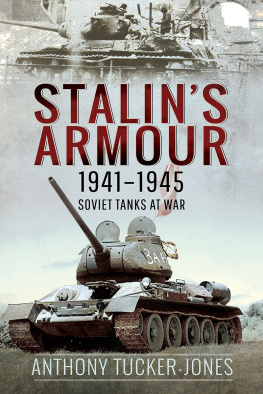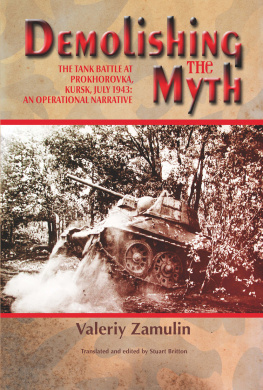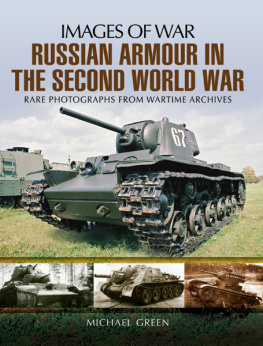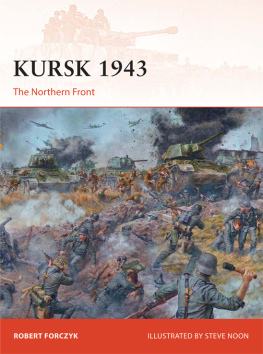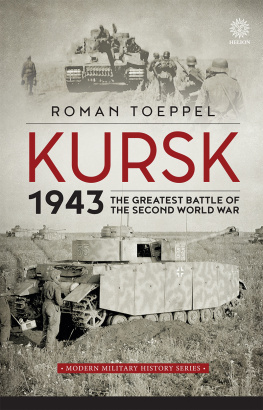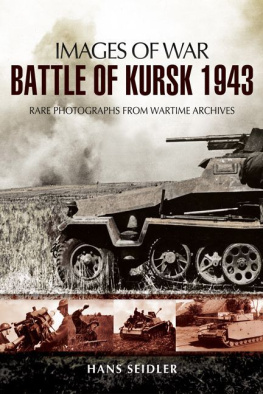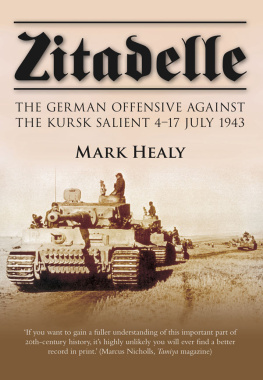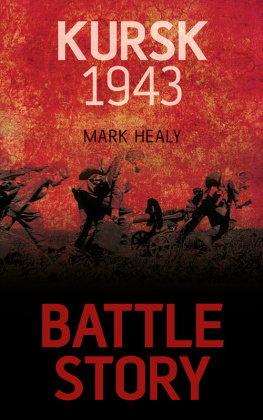Lloyd Clark - The Battle of the Tanks: Kursk, 1943
Here you can read online Lloyd Clark - The Battle of the Tanks: Kursk, 1943 full text of the book (entire story) in english for free. Download pdf and epub, get meaning, cover and reviews about this ebook. year: 2011, publisher: Atlantic Monthly Press, genre: Science. Description of the work, (preface) as well as reviews are available. Best literature library LitArk.com created for fans of good reading and offers a wide selection of genres:
Romance novel
Science fiction
Adventure
Detective
Science
History
Home and family
Prose
Art
Politics
Computer
Non-fiction
Religion
Business
Children
Humor
Choose a favorite category and find really read worthwhile books. Enjoy immersion in the world of imagination, feel the emotions of the characters or learn something new for yourself, make an fascinating discovery.
- Book:The Battle of the Tanks: Kursk, 1943
- Author:
- Publisher:Atlantic Monthly Press
- Genre:
- Year:2011
- Rating:3 / 5
- Favourites:Add to favourites
- Your mark:
- 60
- 1
- 2
- 3
- 4
- 5
The Battle of the Tanks: Kursk, 1943: summary, description and annotation
We offer to read an annotation, description, summary or preface (depends on what the author of the book "The Battle of the Tanks: Kursk, 1943" wrote himself). If you haven't found the necessary information about the book — write in the comments, we will try to find it.
Lloyd Clark: author's other books
Who wrote The Battle of the Tanks: Kursk, 1943? Find out the surname, the name of the author of the book and a list of all author's works by series.
The Battle of the Tanks: Kursk, 1943 — read online for free the complete book (whole text) full work
Below is the text of the book, divided by pages. System saving the place of the last page read, allows you to conveniently read the book "The Battle of the Tanks: Kursk, 1943" online for free, without having to search again every time where you left off. Put a bookmark, and you can go to the page where you finished reading at any time.
Font size:
Interval:
Bookmark:

THE
BATTLE
OF THE
TANKS
Also by Lloyd Clark
1918 Flawed Victory
The Fall of the Reich (with D. Anderson)
The Eastern Front (with D. Anderson)
World War One A History
The Orne Bridgehead
Operation Epsom
Anzio: Italy and the Battle for Rome 1944
Crossing the Rhine: Breaking into Nazi Germany 1944
and 1945 The Greatest Airborne Battles in History
THE
BATTLE
OF THE
TANKS
Kursk, 1943
LLOYD CLARK

Atlantic Monthly Press
New York
Copyright 2011 by Lloyd Clark
All rights reserved. No part of this book may be reproduced in any form or by any electronic or mechanical means, including information storage and retrieval systems, without permission in writing from the publisher, except by a reviewer, who may quote brief passages in a review. Scanning, uploading, and electronic distribution of this book or the facilitation of such without the permission of the publisher is prohibited. Please purchase only authorized electronic editions, and do not participate in or encourage electronic piracy of copyrighted materials. Your support of the authors rights is appreciated. Any member of educational institutions wishing to photocopy part or all of the work for classroom use, or anthology, should send inquiries to Grove/Atlantic, Inc., 841 Broadway, New York, NY 10003 or .
First published in Great Britain in 2011 by HEADLINE REVIEW,
an imprint of Headline Publishing Group, London
Printed in the United States of America
ISBN-13: 9780802195104
Atlantic Monthly Press
an imprint of Grove/Atlantic, Inc.
841 Broadway
New York, NY 10003
Distributed by Publishers Group West
www.groveatlantic.com
11 12 13 1410 9 8 7 6 5 4 3 2 1
Contents
| 1 |
| 2 |
| 3 |
| 4 |
| 5 |
| 6 |
| 7 |
| 8 |
| 9 |
For the boys: Charles (Nobby), John C., Brent, Freddie, Henry,
Len, Steve, John H. and Nicholas. Outnumbered but awesome.
For two more girls: Tilda and Orla. Even more formidable
Acknowledgements
This book has been, without doubt, the most demanding that I have written. Pulling together the research has proved a massive effort under some trying conditions and I was extremely fortunate to have been helped in my task by some outstanding people. No matter where I travelled in the world, more often than not I came across folk who did their utmost to help me. I feel particularly honoured and privileged to have spent so much time with veterans of the Battle of Kursk. In common with my previous experience with veterans, they were unfailingly courteous, helpful and made me promise that I would do justice to their experiences. I hope that they find this book worthy. All errors and omissions that you may find in this book however, are mine and mine alone.
I should like to thank the staff at the following archives, libraries, museums and other institutions for the help they have given to me over the three years that this book was in preparation: the National Archives, London; the Imperial War Museum, London; the Liddell Hart Centre for Military Archives, Kings College London; the Royal Historical Society, London; the Institute for Historical Research, University of London; the School of Slavonic and East European Studies, University College London; the University of London Library; the Central Library, the Royal Military Academy Sandhurst; the Prince Consorts Library, Aldershot; the British Museum, London; the Tank Museum, Bovington, Dorset; Das Bundesarchiv, Freiburg and Koblenz; the National Archives, Maryland and Washington D.C.; the Library of Congress, Washington D.C., and the Central Archive of the Russian Ministry of Defence, Podolsk.
I am grateful for having been granted permission to quote from the following books: Panzer Operations by Erhard Raus, published by Frontline Books; Red Road from Stalingrad by Mansur Abdulin, published by Pen and Sword Books; In Deadly Combat A German Soldiers Memoir of the Eastern Front by Gottlob Herbert Bidermann, published by the University Press of Kansas 2000; 800 Days on the Eastern Front: A Russian Soldier Remembers World War II by Nikolai Litvin, published by the University Press of Kansas 2007, and Panzer Leader by Heinz Guderian published by Penguin Books Limited in the UK and to Elisabeth Grfin Schulenburg for the US permissions. While I have endeavoured to trace the copyright-holders of all material from which I have quoted, I have failed to trace some while others have not responded to my emails, letters and telephone calls. I would, however, be pleased to rectify any omission in future editions should copyright-holders contact me.
My thanks are also due to: the Ministry of Defence; the Commandant of the Royal Military Academy Sandhurst; Andrew Orgills superb team in the Royal Military Academys Central Library, and to Sean McKnight and Dr Duncan Anderson for granting me a terms sabbatical to finish this book. I am also indebted to my colleagues in the Department of War Studies for picking up my responsibilities so willingly during my absence. I should like to extend my gratitude to General Sir Richard Dannatt, Major General Anthony Deane-Drummond, Lieutenant Colonel Roger Morton and Major Tony Borgnis for their time and inspiration. I am indebted to my military students at Sandhurst and on the Armys Military Analysis Course, and to my post-graduate civilian students at the University of Buckingham for their constructive criticism. Professors John Adamson, Saul David and Gary Sheffield along with Ro Horrocks and her battlefield tourists too many to mention, but you know who you are need to be thanked for their comments and encouragement.
I am deeply grateful for the unstinting humour, diligence and determination of the small team who assisted me with the research for this book: Debbie Fields, Leo Berger, David Rogers and Alex Kuzin we got there in the end! I am also appreciative of Graeme Reid-Daviss help with some translations and pronunciations, Ian Breens tolerance whilst driving me across foreign fields and Mark Waterhouses map-reading skills. I am beholden to Charlie Viney, my exceptional agent, for his unfailing enthusiasm and support. I have also been extremely fortunate working with two professional, and patient, editorial teams at my publishers in the UK and US and my thanks are due to Martin Fletcher and Emily Griffin at Headline, and Jofie Ferrari-Adler, Jamison Stoltz and Morgan Entrekin at Grove Atlantic. My gratitude is further extended to Marion Paull for her truly excellent copyedit, Lorraine Jerram for her proofreading, and Alan Collinson at Geo-Innovations for the maps.
My deepest thanks, however, are due to the people who kept me sane over the days, weeks, months and years, ensuring that my feet remained firmly planted on the ground, enthused me in dark moments and put up with my frequent trips away from home. Catriona, Freddie, Charlotte and Henry, you are the best family a man could ever want.
Lloyd Clark
Wigginton Bottom and Camberley, November 2010
Maps
Introduction
The Battle of Kursk was the greatest land battle the world has ever seen on a fighting front that epitomized total war. Here was a barbaric campaign of passion and intensity, which was deeply rooted in ideology and centred on annihilation. It was a confrontation characterized by hideous excess and outrageous atrocities, involving the two largest national armies ever amassed, and fought over four years in operations stretching from the Arctic Circle to the Black Sea. It concluded with Germany having incurred nearly three million military dead and the Soviet Union a staggering 10 million. The Soviet losses alone equated to the total number of dead from all belligerent nations on all fronts during the Great War. Every week Stalins armed forces accumulated a football stadiums worth of dead, and every three months mourned as many lives as the United States did in the entire war. Seventeen million civilians also perished as a direct result of the fighting between 22 June 1941 and 8 May 1945, in a conflict that set new standards in depravity and inhumanity. It was a war that proved to be another national trauma in a turbulent century for the Soviet Unions ill-fated population, one that placed the enemy on the outskirts of their capital city and demanded seemingly endless sacrifice before it was over.
Next pageFont size:
Interval:
Bookmark:
Similar books «The Battle of the Tanks: Kursk, 1943»
Look at similar books to The Battle of the Tanks: Kursk, 1943. We have selected literature similar in name and meaning in the hope of providing readers with more options to find new, interesting, not yet read works.
Discussion, reviews of the book The Battle of the Tanks: Kursk, 1943 and just readers' own opinions. Leave your comments, write what you think about the work, its meaning or the main characters. Specify what exactly you liked and what you didn't like, and why you think so.


